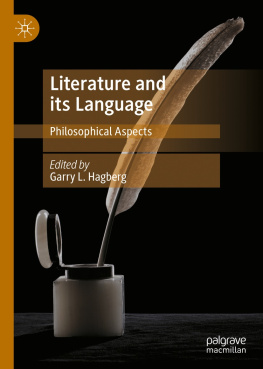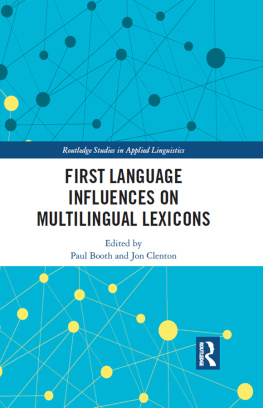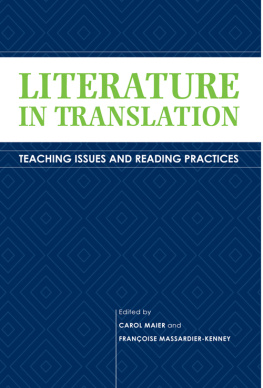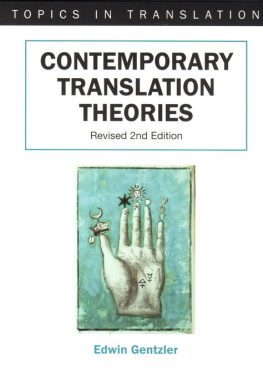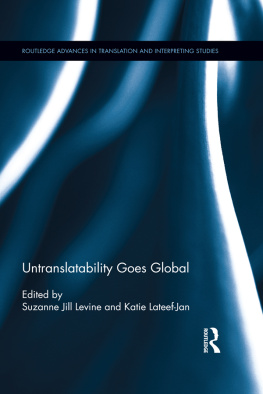Contents
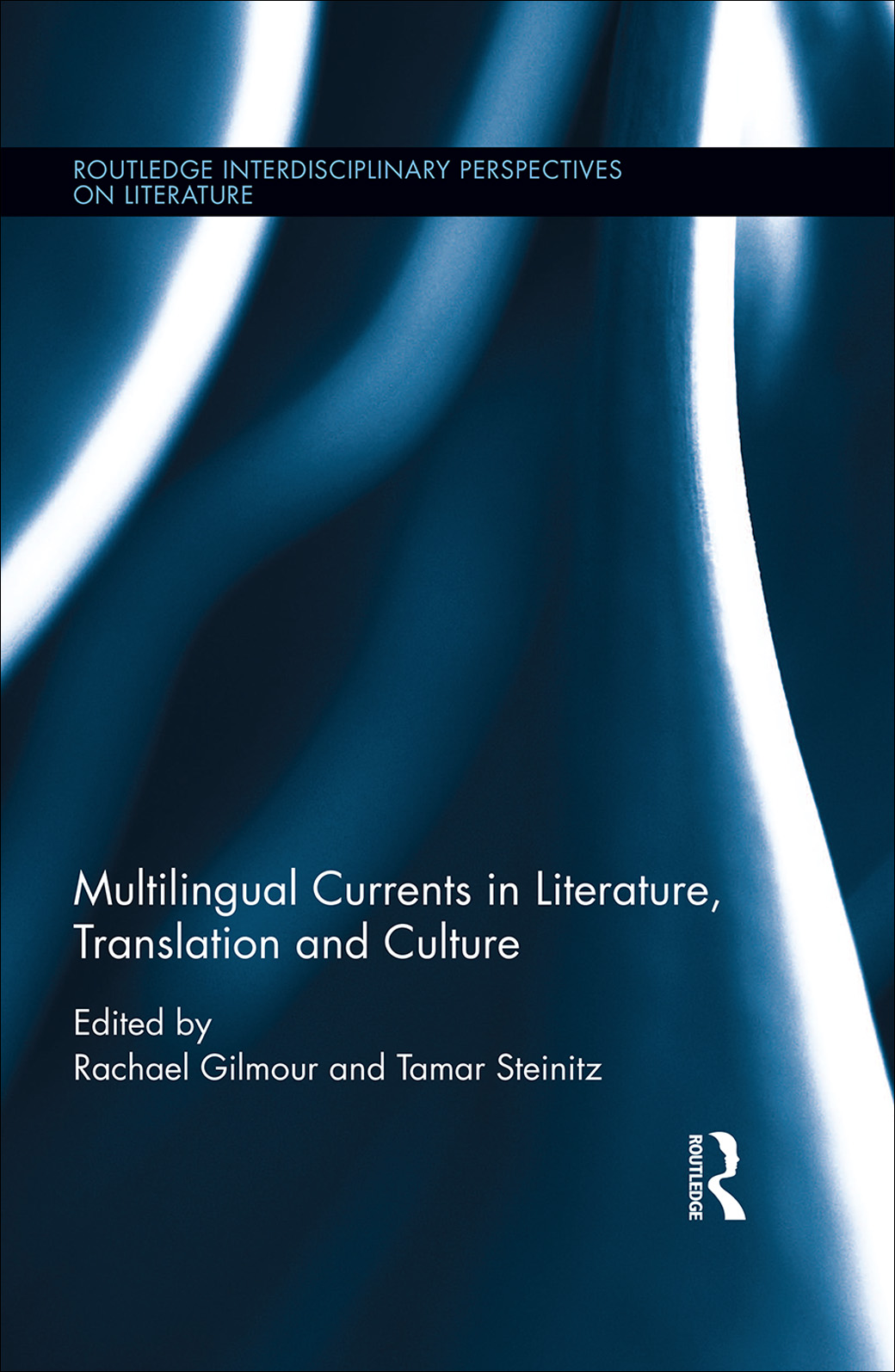
Multilingual Currents in Literature, Translation, and Culture
At a time increasingly dominated by globalization, migration, and the clash between supranational and ultranational ideologies, the relationship between language and borders has become more complicated and, in many ways, more consequential than ever. This book shows how concepts of language and multilingualism look different when viewed from Belize, Lagos, or London, and asks how ideas about literature and literary form must be remade in a contemporary cultural marketplace that is both linguistically diverse and interconnected, even as it remains profoundly unequal. Bringing together scholars from the fields of literary studies, applied linguistics, and translation studies, the volume investigates how multilingual realities shape not only the practice of writing but also modes of literary and cultural production. Chapters explore examples of literary multilingualism and their relationship to the institutions of publishing, translation, and canon-formation. They consider how literature can be read in relation to other multilingual and translational forms of contemporary cultural circulationsuch as music and filmand what new interpretative strategies such developments demand. In tracing the multilingual currents running across a globalized world, this book will appeal to the growing international readership at the intersections of comparative literature, world literature, postcolonial studies, literary theory and criticism, and translation studies.
Rachael Gilmour is Reader in Postcolonial and World Literatures in the Department of English at Queen Mary, University of London, UK.
Tamar Steinitz is Lecturer in the Department of English and Comparative Literature at Goldsmiths, University of London, UK.
Routledge Interdisciplinary Perspectives on Literature
For a full list of titles in this series, please visit www.routledge.com.
74 Food and Foodways in African Narratives
Community, Culture, and Heritage
Jonathan Bishop Highfield
75 The Phenomenology of Autobiography
Making it Real
Arnaud Schmitt
76 The Cultural Imaginary of Terrorism in Public Discourse, Literature, and Film
Narrating Terror
Michael C. Frank
77 The Centrality of Crime Fiction in American Literary Culture
Edited by Alfred Bendixen and Olivia Carr Edenfield
78 Motherhood in Literature and Culture
Interdisciplinary Perspectives from Europe
Edited by Victoria Browne, Adalgisa Giorgio, Emily Jeremiah, Abigal Lee Six, and Gill Rye
79 Heritage and the Legacy of the Past in Contemporary Britain
Ryan Trimm
80 Storytelling and Ethics
Literature, Visual Arts and the Power of Narrative
Edited by Hanna Meretoja and Colin Davis
81 Multilingual Currents in Literature, Translation, and Culture
Edited by Rachael Gilmour and Tamar Steinitz
First published 2018
by Routledge
711 Third Avenue, New York, NY 10017
and by Routledge
2 Park Square, Milton Park, Abingdon, Oxon OX14 4RN
Routledge is an imprint of the Taylor & Francis Group, an informa business
2018 Taylor & Francis
The right of Rachael Gilmour and Tamar Steinitz to be identified as the authors of the editorial material, and of the authors for their individual chapters, has been asserted in accordance with sections 77 and 78 of the Copyright, Designs and Patents Act 1988.
All rights reserved. No part of this book may be reprinted or reproduced or utilised in any form or by any electronic, mechanical, or other means, now known or hereafter invented, including photocopying and recording, or in any information storage or retrieval system, without permission in writing from the publishers.
Trademark notice: Product or corporate names may be trademarks or registered trademarks, and are used only for identification and explanation without intent to infringe.
Library of Congress Cataloging-in-Publication Data
CIP date has been applied for.
ISBN: 978-1-138-12053-2 (hbk)
ISBN: 978-1-315-65167-5 (ebk)
Typeset in Sabon
by codeMantra
Rachael Gilmour and Tamar Steinitz
The current state of globalization is daily questioningthrough the expansion of capital, new financial circuits, technoglobalism, and massive migrationsnational ideals and principles about the purity of language, the homogeneity of literature, and the distinctiveness of national cultures.
Walter Mignolo
We only ever speak one language
(yes, but)
We never speak only one language
Jacques Derrida
This book is concerned with the circuits of language in the contemporary world, and with their implications for our understanding of literature now. While making no claims for a new global linguistic order entirely ruptured from those which came before, it argues that existing literary paradigms ill equip us to understand the complex forces that shape language in the present as they impact upon the production and circulation of literature. In tracing these forces, it takes up questions which, in many ways, define the current moment: the impact of accelerated patterns of migration precipitated by war and conflict, economic pressures, and environmental degradation; the relationship between national and supranational political formations and ideologies; and the transformative effects of transnational flows of culture, capital, electronic media, and technology. As we argue here, literature is sensitive and responsive to these developments, registering new kinds of linguistically and symbolically complex contexts and cultures. These trends shape not only the practice of writing, but also its production and circulation in a cultural marketplace that is increasingly interconnected even as it remains profoundly unequal. And so, the chapters in this collection explore how ideas about literature, literary form, and organizing concepts such as language itself must be rethought in light of these accelerating processes, which operate at scales from the local to the global. The contributions here operate on the premise that monolingual paradigms are inadequate in a world dominated by globalization and migration. Furthermore, they seek alternatives to a homogenizing tendency in the still-emerging field of World Literature that emphasizes the rise of so-called global English and relies on Western, often Anglophone, systems of production and circulation, both of literary and cultural texts and of scholarly discourses about them. Conventional national categorizations no longer adequately reflect a literary world in flux, and traditional disciplinary divisions also come under pressure as literary studies seek new critical paradigms. This collection, therefore, approaches the field of contemporary multilingual literature and culture from a range of locations and disciplinary intersections, bringing to bear insights from translation studies and linguistics, and considering literature in relation to other forms of cultural production.
Although paradigms of monolingual, national literatures continue to dominate literary scholarship at an institutional level, it is nevertheless true that they have long been problematized. Postcolonial literary studies, even in their persistent concern with the former European colonial languages (primarily English), see those languages reterritorialized away from their conventional centres of gravity in Europeas, in the well-known formulation by Ashcroft et al., in the shift from English to englishesand historicize and materialize that reterritorialization, through global linguistic flows precipitated by European colonialism and continued by contemporary globalization.


